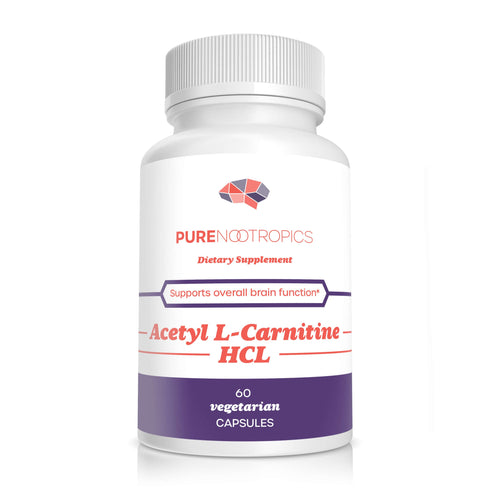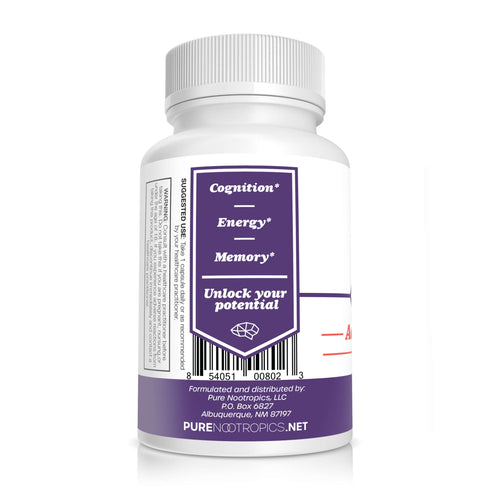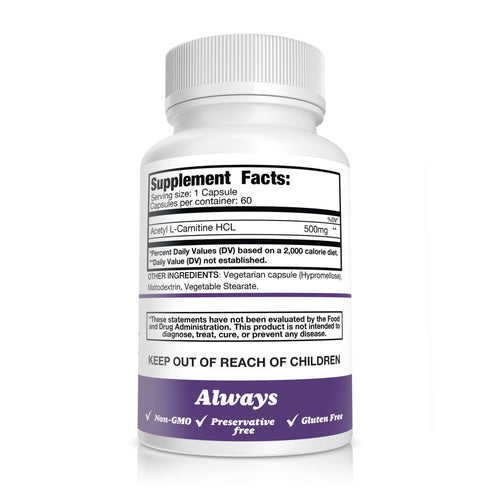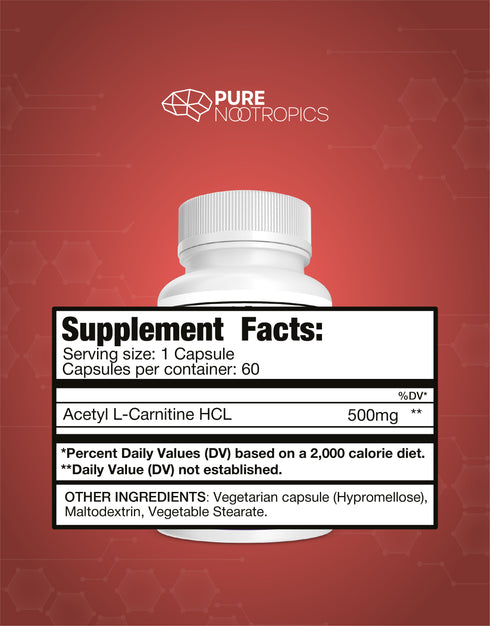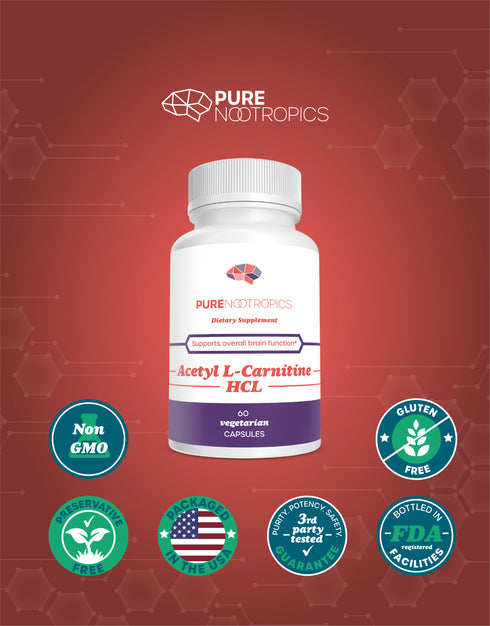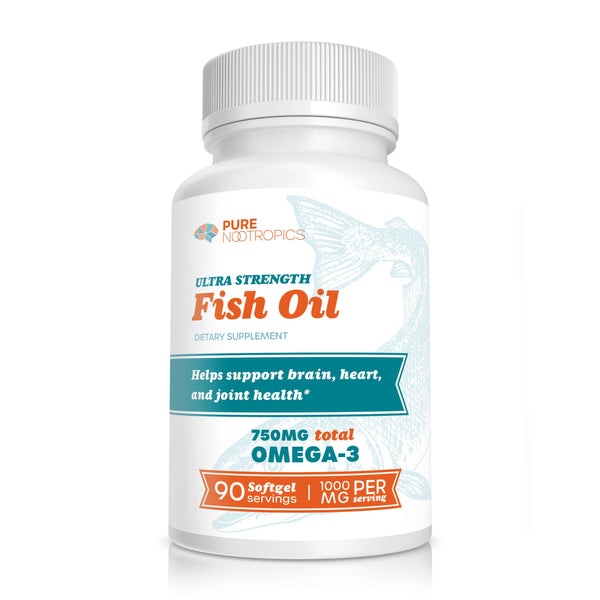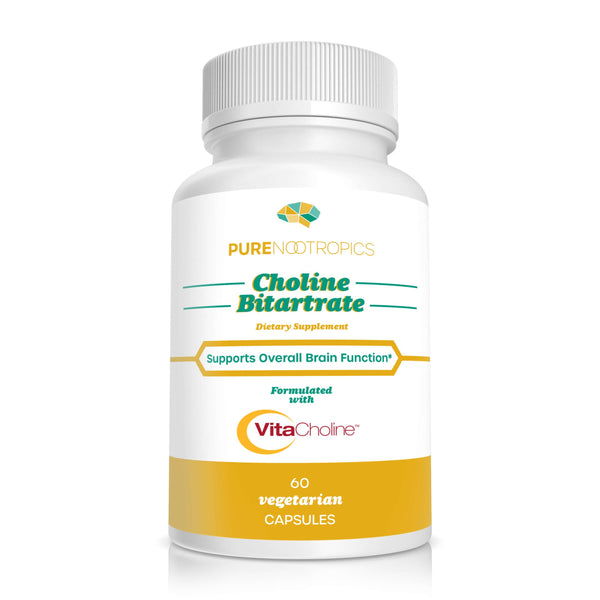Acetyl-L-Carnitine is an amino acid derivative of L-Carnitine.
- Promotes healthy cognition in elderly (ref)*
- Supports energy levels (ref)*
- Promotes neuron health (ref)*
Acetyl-L-Carnitine Mode of Action
The amino acids Acetyl-L-carnitine (ALCAR) and L-Carnitine are naturally occurring in the body. The body converts L-Carnitine, ingested from animal meats or synthesized from the amino acids methionine and lysine, into ALCAR and then back to L-carnitine as needed (2).
ALCAR is a form of L-carnitine that has unique functions which set it apart from L-carnitine. ALCAR is responsible for transporting fatty acids across mitochondrial membranes.
ALCAR is aimed more towards cognitive health than other forms of L-carnitine (2).
Vegetarians and vegans who do not eat meat have lower levels of carnitine (2).
Acetyl-L-Carnitine Dosage
Pure Nootropics’ Acetyl-L-Carnitine provides 500 mg per 1 capsule. Suggested use for adults is 1 capsule by mouth once daily, or as directed by your healthcare practitioner.
Acetyl-L-Carnitine Side Effects
If you are taking blood-thinning medications (anticoagulants), please consult with your healthcare practitioner before beginning use of ALCAR.
Some psychological disorders, thyroid disorders, and seizure disorders may be adversely affected by ALCAR. If you have any conditions, or are taking any medications, herbs, or supplements, please consult with your healthcare practitioner before beginning use of ALCAR (1).
For further information, please see our References Tab above.
The references below are not meant to imply that any of our products treat, cure, or diagnose any disease or human condition. References to clinical studies and pre-clinical studies may use varying dosages and may not represent the dosages or subsequent results of products we sell; however, the references provided are pertinent to the subject supplement itself. References provided are intended for research and informational purposes only and do not represent the entire body of knowledge available on the subject(s) referenced; nor do they represent all possible outcomes associated with the subject(s) referenced including, but not limited to, adverse effects, precautions, or chemical interactions within the human body. The Content provided on this website is not intended to be a replacement for professional medical advice, treatment or diagnosis. Never ignore the advice of a medical professional or delay in attaining professional advice because of information or impressions you gather on this website. Choosing to rely on any information provided by the Content of this website is solely at your own risk. We encourage our audience to do their own research beyond the resources we have provided so your decision is as educated as possible.
• Promotes healthy cognition in the elderly*
Malaguarnera, M, et al. “Acetyl L-Carnitine (ALC) Treatment in Elderly Patients with Fatigue.” Arch Gerontol Geriatr., vol. 46, no. 2, 2008, pp. 181–90., doi: 10.1016/j.archger.2007.03.012.
• Supports energy levels in adults*
Malaguarnera, M, et al. “Acetyl L-Carnitine (ALC) Treatment in Elderly Patients with Fatigue.” Arch Gerontol Geriatr., vol. 46, no. 2, 2008, pp. 181–90., doi: 10.1016/j.archger.2007.03.012.
• Promotes neuron health*
Bak, SW, et al. “Neuroprotective Effects of Acetyl-L-Carnitine Against Oxygen-Glucose Deprivation-Induced Neural Stem Cell Death.” Mol Neurobiol., vol. 53, no. 10, Dec. 2016, pp. 6644–6652., doi:10.1007/s12035-015-9563-x.
1. “Acetyl-L-Carnitine.” Foods Herbs & Supplements, Professional, https://naturalmedicines.therapeuticresearch.com/databases/food,-herbs-supplements/professional.aspx?productid=834#adverseEvents.
2. “L-Carnitine” Examine.com, published on 12 September 2014, last updated on 1 March 2019, https://examine.com/supplements/l-carnitine/.
3. Linus Pauling Institute. (2019). L-Carnitine. Web. https://lpi.oregonstate.edu/mic/dietary-factors/L-carnitine.


